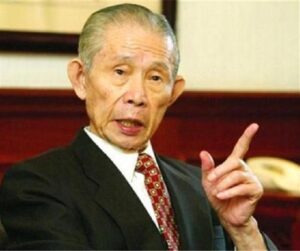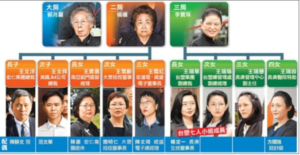
Introduction
Wang Yung-Ching, known as the “God of Management” in Taiwan, was the legendary founder of Formosa Plastics Group, a sprawling business empire spanning petrochemicals, energy, healthcare, and more. Yet, after his passing, his immense fortune sparked a bitter battle among his heirs.
This high-profile dispute offers valuable lessons for anyone thinking about legacy planning. In this article, we’ll explore Wang’s life, business achievements, family structure, the legal battles over his estate, and most importantly, how to avoid similar conflicts in your own family.
Wang Yung-Ching’s Humble Beginnings and Rise to Success
- From Poverty to Self-Made Tycoon
Born in 1917 in Taipei, Taiwan, Wang Yung-Ching grew up in poverty. At just 15, he dropped out of school to work in a rice shop. In 1932, with a loan of $200 from his father, he opened his own rice store. His sharp business instincts and relentless work ethic helped him steadily grow his savings, and by the 1940s, he had ventured into the timber industry.
- Building Formosa Plastics and Becoming the “King of Plastics”
In 1954, Wang and his younger brother Wang Yung-Tsai co-founded Formosa Plastics Corporation (FPC). The early years were tough, but with Wang’s strategic vision, he turned FPC into a global petrochemical powerhouse. Over time, he expanded his empire, establishing subsidiaries like Nan Ya Plastics, Formosa Chemicals & Fibre, and Formosa Petrochemical, solidifying the Formosa Plastics Group as an industrial giant.
Wang Yung-Ching’s Business Empire and Family Structure
- The Formosa Plastics Group’s Vast Business Network
Wang Yung-Ching built his empire around petrochemicals but expanded aggressively into electronics, healthcare, and education. With dozens of subsidiaries under its umbrella, the Formosa Plastics Group became one of Taiwan’s largest private enterprises, at one point generating over NT$2 trillion in annual revenue.
- A Complicated Family Web
Wang had three wives and multiple children, creating a tangled inheritance landscape:
- First Wife (Guo Yuelan): No children.
- Second Wife (Yang Jiao): Mother of five. These children included Winston Wang, Charlene Wang, and Cher Wang. Eldest son, Winston Wang, is known for founding Grace Semiconductor Manufacturing. Daughter Charlene Wang founded First International Computer, Inc.. Cher Wang, another daughter, co-founded HTC and VIA Technologies.
- Third Wife (Li Bao-Zhu): Mother of four, including Wang Rui-Hua and Wang Rui-Yu, who also became influential figures in the family business.

The Estate Planning Controversy and Inheritance Disputes
- Lack of a Clear Will Sowed the Seeds of Conflict
Wang Yung-Ching passed away suddenly in the U.S. in 2008 at the age of 91 without a formal will. He had made some arrangements through trusts and share distributions, but the absence of a definitive estate plan led to fierce disagreements among family members over inheritance rights.
- Key Points of Contention
- Disputes Over Overseas Assets: Wang held substantial assets in the U.S., China, and elsewhere, with some heirs claiming they were unfairly excluded from distributions.
- Legitimacy of Non-Marital Children: Three of Wang’s U.S.-based children, including Lo Wen-Yuan, filed lawsuits to establish paternity and claim their share of the estate.
- Battle Over Trust Control: The family trust holding Formosa Plastics’ major shares became a focal point of power struggles between the different branches of the family.
- Lawsuits and Mediation Efforts
- 2009: Lo Wen-Yuan and his two siblings underwent DNA testing to prove their lineage, then sued for inheritance rights.
- Management Feuds: Sibling rivalries emerged in corporate leadership.
- Outcome: Some cases were eventually settled, but tensions within the family persisted, leaving lasting divisions.
The Aftermath: How the Inheritance Battle Was Resolved (and Its Lasting Impact)
- Partial Settlements, But Scars Remain
Lo Wen-Yuan & Siblings: After a prolonged legal fight, the three U.S. based children secured a portion of the inheritance but were never fully accepted into the inner family circle.
Power Balance at Formosa Plastics: While the second and third wives’ branches retained joint control of the conglomerate, deep-seated mistrust lingered, weakening family cohesion.
- The Fallout for Formosa Plastics
Management Instability: Leadership disputes slowed decision-making, creating operational inefficiencies at a critical time.
Reputation Damage: The public feud tarnished the company’s image, raising doubts among investors about the stability of family-run empires.
The Takeaway: Even the mightiest business dynasties can unravel without clear succession plans, proving that how wealth is passed down matters as much as how it’s built.
Lessons Learned: How to Prevent Inheritance Disputes
Key Takeaways from the Wang Family Feud
- The Importance of a Will: Wang’s lack of a formal will turned inheritance into a battleground proving that estate planning is a must for high-net-worth families.
- The Need for Family Governance: Without a structured family governance system, even the wealthiest dynasties risk infighting over control and assets. This can be implemented through mechanisms like:
- A Family Office: Dedicated teams manage wealth, investments, and succession planning professionally.
- A Private Foundation: Entities like the Labuan Foundation (an offshore structure) provide flexible estate planning beyond just charitable purposes. These foundations offer asset protection, tax efficiency, and controlled wealth distribution across generations.
- Hidden Legal Risks: Unacknowledged heirs (like non-marital children) can emerge as disruptive claimants if not addressed proactively.
How to Protect Your Legacy

Specify asset distribution to minimize ambiguity and litigation.

Family Office: Centralizes wealth management and succession planning.
Labuan Foundation: Offshore foundations provide privacy, tax advantages, and structured inheritance solutions while avoiding probate delays.

- Lawyers and trust administrators complement these services by ensuring legal compliance.
- Work with specialists like Core Advisors, an independent boutique advisory firm that provides tailored financial and wealth management services for HNW individuals and institutions.

Proactively address inheritance taxes and international holdings to avoid surprises.
Final Thought:
Wealth preservation isn’t just about growing assets; it’s about strategizing how they transition. The Wang family’s story is a cautionary tale but also a roadmap for smarter planning.
With the right advisors like Core Advisors and tools like Family Offices and Labuan Private Foundations, families can secure their legacies without costly disputes.
Discover more about Core Advisors Limited and the services it provides
